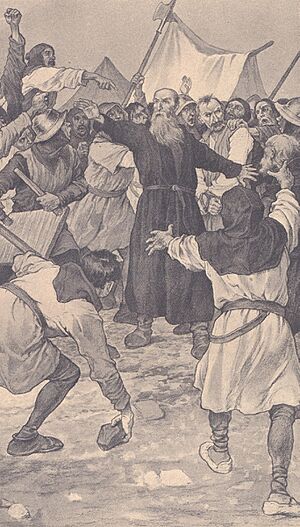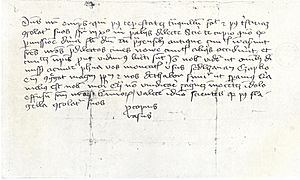Prokop the Great facts for kids
Prokop the Great (also known as Prokop the Bald or the Shaven) was an important Czech military leader. He lived from about 1380 to 1434. Prokop was a general for the Hussites, a religious group in Bohemia (now the Czech Republic). He led the Taborites, a strong part of the Hussite army, during the Hussite Wars.
Prokop came from a well-known family in Prague. He was a priest and studied in Prague before traveling a lot. When he came back, he became a key leader for the Hussite forces. He led them to big victories against their enemies.
Contents
Prokop's Early Life and Role
Prokop was born around 1380. His family was important in Prague. He became a priest early in his life. He was part of the Utraquists, who were a more moderate group within the Hussites.
He studied in Prague and then traveled to other countries. When he returned, he became a powerful leader. He led the Taborites, who were the more radical Hussite group. He took command after other leaders, but not right after Jan Žižka.
Major Victories and Peace Talks
Prokop led the Taborite army to important wins. In 1426, they won the Battle of Ústí nad Labem. In 1431, they had another big victory at the Battle of Domažlice. These battles were against German and Catholic armies.
His victory at Domažlice was a huge defeat for the crusaders from the Holy Roman Empire. This led to peace talks in 1432 at Cheb. Prokop and other Hussites met with representatives from the Council of Basel.
Campaigns and Negotiations
Prokop also led the Taborites on raids into Hungary and Germany. In 1429, a large Hussite army went into Saxony and the area around Nuremberg. The Hussites did not try to take over German lands permanently.
On February 6, 1430, Prokop signed a treaty at Kulmbach. This treaty was with Frederick I, a leader from Nuremberg. The Hussites agreed to leave Germany.
Later, the Hussites talked with Emperor Sigismund and the Council of Basel. After long discussions, they decided to send a group to the council. Prokop the Great was a main member of this group. They arrived in Basel on January 4, 1433.
The talks there did not go well at first. So, Prokop and the other envoys went back to Bohemia. New problems started there among the Hussites.
Final Battle and Legacy
A Taborite army led by Prokop the Great began to besiege Plzeň. This city was held by Catholics. However, the soldiers in the Hussite camp were tired from the long war. They rebelled against Prokop, so he went back to Prague.
Seeing these problems among the Taborites, the Bohemian nobles decided to act. Both Catholic and Utraquist nobles formed a group. They wanted to stop the radical Hussites, who had become very powerful in the towns.
The fighting began in Prague. The nobles helped the citizens of the Old Town take over the New Town. Prokop tried to defend the New Town but failed. He called for help from Prokop the Lesser, who had taken over command of the Taborite army at Plzeň.
Together, Prokop the Great and Prokop the Lesser retreated from Prague. Their army met the army of the nobles between Kourim and Kolín. This was the Battle of Lipany on May 30, 1434. The Taborites were badly defeated. Both Prokop the Great and Prokop the Lesser died in this battle.
Prokop the Great is remembered as a brave and skilled military leader. A rifle regiment of Czechoslovak legions was named after him in July 1917.
See also
 In Spanish: Procopio el Grande para niños
In Spanish: Procopio el Grande para niños
 | Sharif Bey |
 | Hale Woodruff |
 | Richmond Barthé |
 | Purvis Young |



